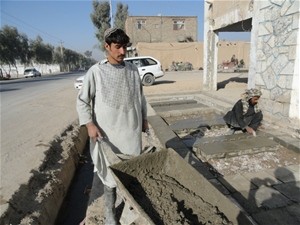
“All I really want is a chance to make an honest living and learn a skill.” - Ahmadjon, Kandahari cashfor- work beneficiary
USAID/CADG
Cash-for-work programs bring economic opportunity and stability to vulnerable communities throughout Afghanistan
28 MARCH 2011 | KANDAHAR PROVINCE, AFGHANISTAN
For many young Afghan men, finding work that pays enough to support a family is a daunting challenge, especially if they don’t have education or technical skills. Many have no choice but to seek work from anti-government elements in order to provide for their families. However, USAID stabilization programs are giving thousands of Kandahari men another option.
Ahmadjon is a young man who had no direction. He wanted to learn a skill, but lacked training or an apprenticeship. His future did not look good. “I was doing some odd jobs here and there, but it was hardly enough money to support my mother and father,” he said. Ahmadjon’s father was concerned that his son would get involved in stupid things to make money. When Ahmadjon learned that the Kandahar municipal government was looking for unskilled laborers, he embraced the opportunity. Soon, he found himself hauling cement at a cash-for-work project to construct a 25-kilometer sidewalk funded by USAID.
Hauling cement is hard work, but the sense of pride Ahmadjon gets earning honest money brings him an immense amount of satisfaction. He admits that the work is physically demanding, but recognizes that this will give him other opportunities. “At the worksite, I’m able to talk with the masons and I’m hoping that they will train me to become one,” he said. Now that Ahmadjon is earning a steady paycheck, his parents will begin the search to find a wife for him, an important milestone in a young Afghan’s life.
Through its Community Development Program and other cash-for-work stabilization projects, USAID is helping thousands of Afghans, both skilled and unskilled, to find employment in order to address the lack of economic opportunity, a significant driver of instability in Afghanistan. USAID continues to promote stability in Afghanistan’s most volatile provinces by and assisting local government structures to respond to community needs and address the major drivers of instability.







Comment
Make a general inquiry or suggest an improvement.